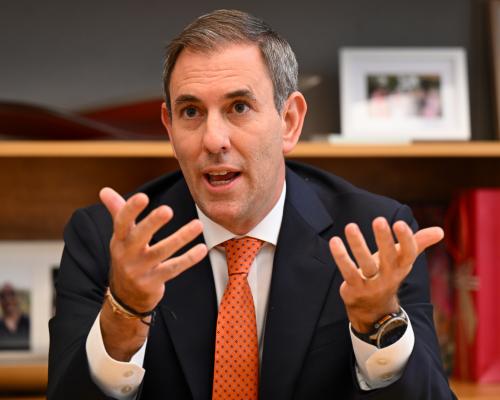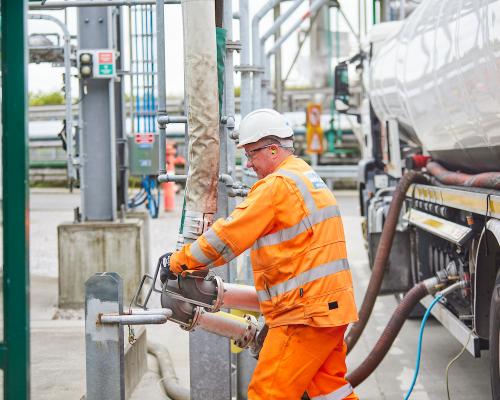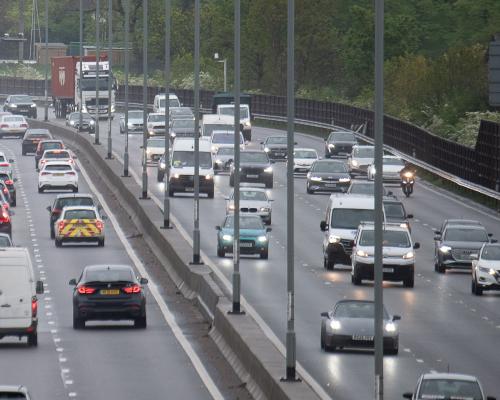
The federal treasurer says too many people across Australia are “burning cash waiting for approvals to build things” while flagging the Albanese government’s overhaul of environment laws could help boost productivity.
Labor is planning to reform the Environment Protection and Biodiversity Conservation Act after failing to deliver promised changes in its first term.
Jim Chalmers, speaking to Guardian Australia ahead of next week’s next economic reform roundtable, said better rules and processes were needed for faster approvals, while still protecting nature.
“It will be one of the main ways that people think through our regulatory challenges and our challenges around the time it takes to get projects approved,” Chalmers said.
Sign up: AU Breaking News email
“In all the consultation I’ve been doing – in housing, renewable energy projects – there are too many instances where people are burning cash waiting for approvals to build things that we desperately want people to build.”
Legislating a federal environment protection agency was a “very high and immediate” priority for the re-elected Labor government, the new environment minister, Murray Watt, said in May.
Watt signalled he wanted nature laws passed quickly to avoid another drawn-out political fight.
The former Treasury boss and environment campaigner Ken Henry has pitched the redesign as a productivity measure, comments Chalmers welcomed in his Guardian interview. He said other stakeholders had expressed similar views about the Howard-era laws to him privately in recent months.
“The status quo is no longer acceptable on the EPBC Act,” the treasurer said.
The goal of cutting cumbersome environmental regulation while maintaining environmental protections has eluded both sides of politics for more than a decade.
The Abbott government campaigned against “green tape” and gave state and territory governments sole responsibility for approving projects.
The prime minister, Anthony Albanese, scuttled a deal with the Greens to pass the so-called “nature positive laws” at the end of 2024, fearing a backlash in resources-reliant Western Australia.
Labor wants to push changes through federal parliament within 18 months, likely as one package of laws rather than in multiple stages – as attempted by the former environment minister Tanya Plibersek.
Treasury included reforms to environmental rules that would free up an estimated 30,000 additional housing approvals in a list of potential outcomes from the roundtable, which was leaked to the ABC on Thursday.
Chalmers said there were already “green shoots” emerging in Australia’s housing affordability and supply crisis, promising further moves to accelerate construction and planning approvals.
Welcoming an uptick in recent official homebuilding data, the treasurer said Labor was determined to speed up approvals for as many as 65,000 new homes, part of efforts to build 1.2m new dwellings by 2029.
“We’ll do better on housing if everyone does their bit,” Chalmers said.
“I’m confident that people in all parts of the system, investors, states and territories, certainly the commonwealth, the industry, there is a real appetite to work together to build more homes more quickly, and so that’s why we’ve got such an open mind to the ideas that people have been raising with us.”
The 1.2m target will be a challenge for the Albanese government, with Treasury and industry warning sluggish approval times and workforce shortages will make it hard to reach.
But Chalmers said work by the housing minister, Clare O’Neil, and this week’s change by corporate regulator Asic to review rules requiring superannuation funds to disclose stamp duty paid on residential real estate will help speed up new construction.
The so-called RG97 rule forces investors to declare stamp duty costs and is considered a deterrent to some investment. If implemented, the change could mean an extra 35,000 homes being built, Chalmers said.
“The last four or five datasets on housing, we’ve seen green shoots.”
Chalmers used an address to the National Press Club on 18 June to suggest the roundtable could deliver concrete tax reform proposals, declaring that “no sensible progress can be made on productivity, resilience or budget sustainability without proper consideration of more tax reform”.
But weeks later, it was clear that the prime minister had become concerned the government was losing control of expectations, and moved quickly to rein in excitement over what the roundtable would achieve.
“The government will make decisions, and the roundtable isn’t a substitute for government decision-making,” Albanese said on 6 August.
Days later, the prime minister killed off any immediate hopes of tax reform.
“The only tax policy that we’re implementing is the one that we took to the election,” he said.
Labor has faced calls from unions for a minimum 25% tax rate on high earners. The ACTU called for a 25% levy on LNG exports and caps to limit diesel fuel rebate payments to big corporations, as well as a four-day week for some workers.
The Productivity Commission has already proposed slashing the company tax rate to 20% for firms with less than $1bn in annual turnover, as well as a 5% net cashflow tax on about 500 of the country’s biggest businesses, including miners and supermarkets.
Albanese has ruled out changes to the rate and base of the GST and negative gearing, while changes to generous capital gains tax concessions and negative gearing rules for property investors look too politically sensitive.
With expectations now firmly lowered, questions have been asked about the value of the three-day roundtable, particularly in the context of the enormous ministerial and departmental effort involved.
“There’s been a heap of effort, working around the clock for four weeks to make sure that people’s voices are heard and that we can shape up a meaningful and useful roundtable,” Chalmers said.
“I see it as three days to help inform three budgets.”







